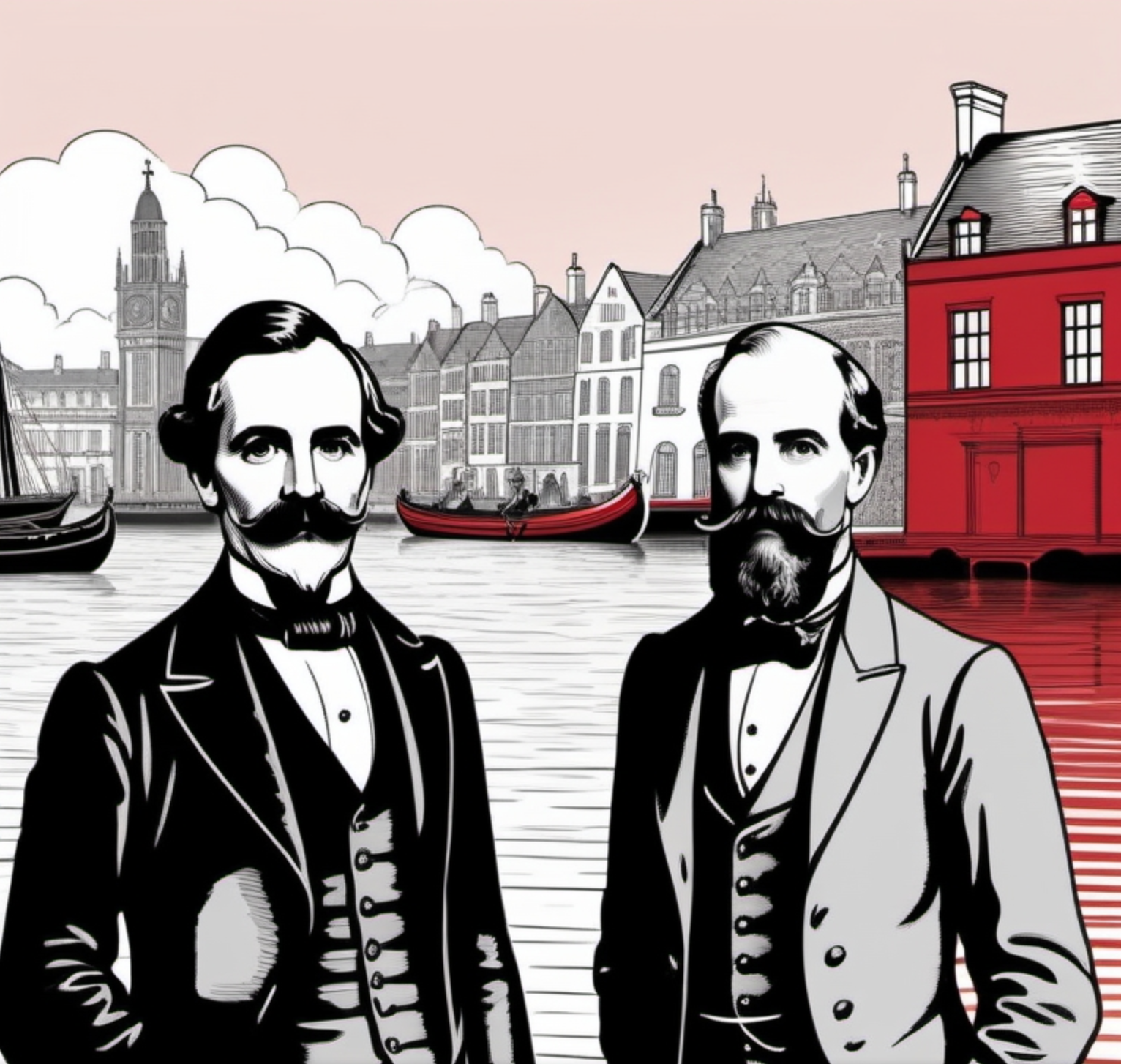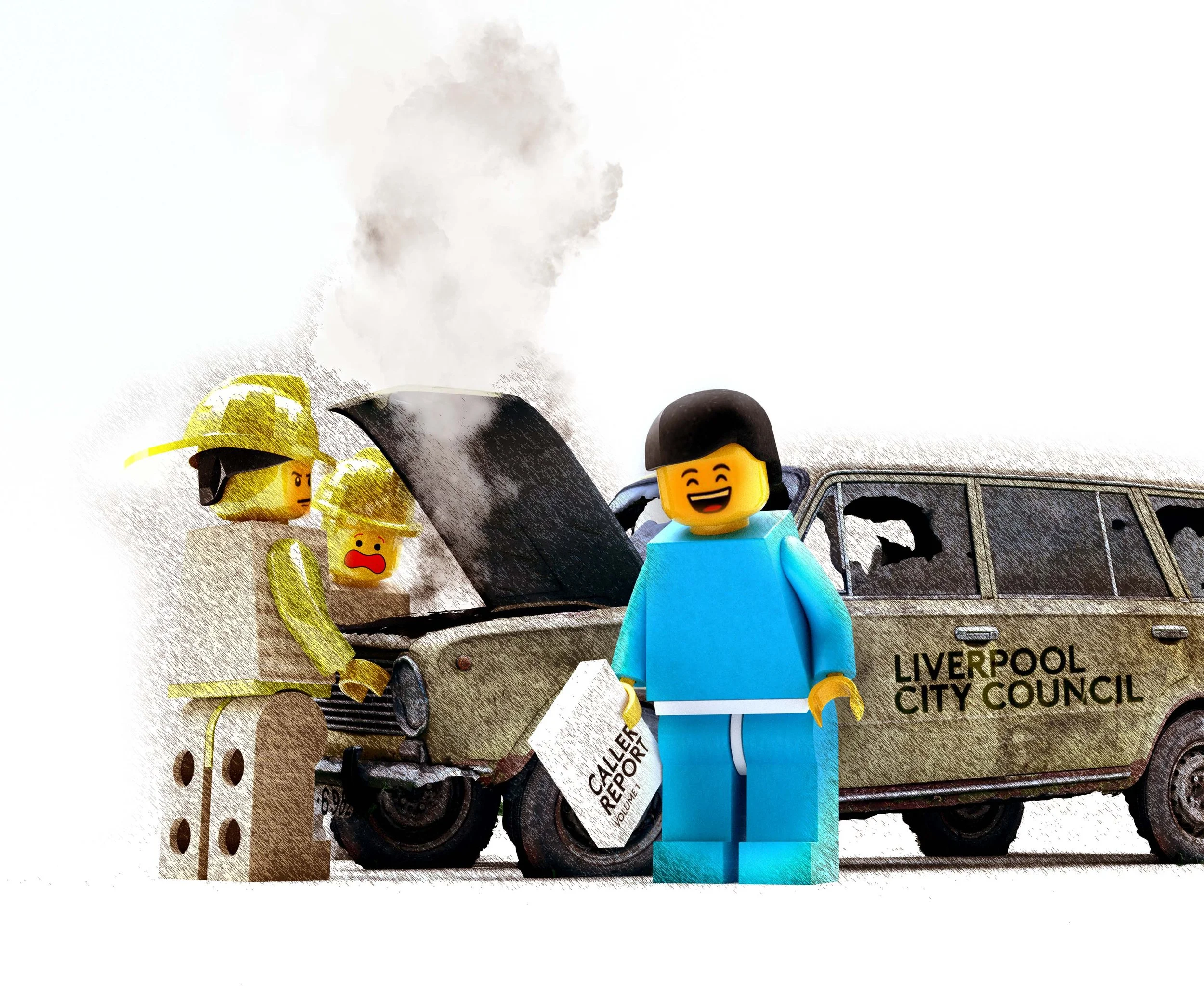Recent features
The Scourge of Northwesternism
In England’s Northwest, one city blooms while another withers on the vine. Manchester is reaching for the skies while Liverpool stares at its navel. A cancerous rot is eating away at my city’s self-esteem. It deserves a name. I call it Northwesternism.
Michael McDonough and Paul Bryan
Does anyone else notice that simmering sense of defeatism running through pretty much everything Liverpool does today? Whether it’s politics, culture or architecture there seems to be a crushing sense of meekness dragging down or at the very least blowing off course the city’s regeneration. You don’t have to look too far to find the evidence, from Liverpool’s proposed new stumpy, tall buildings policy, to the attempts to rejuvenate the high street with low-class tat like bingo and go-karts. Even our waterfront indoor arena was built patently too small to compete for the best music acts. We seem to have gotten good at hiding ourselves under a rock.
I noticed this sense of defeatism running through what was otherwise a riveting read by Jon Egan in his recent Liverpolitan article, ‘It’s Time to Get Interesting’. Examining Liverpool’s fallen place in the world, he searched for a solution and built it on the stoniest ground. Believing that “Liverpool’s claims to regional dominance is a boat that has long since sailed”, he called it an “unavoidable truth” that Manchester is now established as the region’s capital. Then from that premise he pitched an idea - unable to escape our fate as the North West’s second fiddle, we should lower our goals and find a workaround based on our outsider status and our sense of difference. He suggested we do this, by making ourselves ‘interesting’, something that comes naturally to us because it’s kind of in our social DNA. Austin, Texas was held up as a possible model to follow, a city which carves out its place in the world under the banner, ‘Keep Austin Weird’.
Now, I know that Jon doesn’t intend to cast Liverpool as a dancing monkey at a freak show, and you could argue that the economic data points to the truth of our cities relative position, but I don’t really see this strategy solving the myriad economic and social problems that Liverpool faces. It doesn’t sound all that far removed from the innovation strategies that have largely failed to deliver innovation. But my biggest problem with it is that it’s premised on pessimism. For me the race to become interesting or to live into our sense of cultural difference is just a way of rationalising our lowered position.
For me this all smacks of a cancerous rot eating away at Liverpool’s self-esteem. A long gestating idea that Liverpool cannot and will not ever again be more than an offshoot of the aspirations of another relatively small, regional UK city. Who the hell wants that? It’s a view that forces us to lower our horizons and settle for less and it has only one direction of travel - from city to village in countless, tiny steps.
I’m sad to say I increasingly see evidence of this sense of cultural pessimism all around me. They say, make no small plans, but we’re becoming experts at it, and you’ll find a whole breed of shamanistic professionals, activists or NIMBYs throwing shade on the very idea of planning big, going tall, and growing our economy. Sometimes they even reject the very concept of competing. This low growth rationalisation of defeat is usually wrapped in warm fuzzy words like sustainability or human-centred development, while a more optimistic view is seen as foolishly utopian or an apologetic for predatory capitalism. Yet just a few miles down the road things look quite different. And for those who want more, it’s often easier to just pack their bags and relocate.
Too much of our professional class appears to have succumbed to the Liverpool-killing long game of ‘regionalism’ - the modern face of managed decline. You can hear it in the language, and see it in the initiatives. It’s almost as if a subconscious decision-making 'culture' has pushed Liverpool to the periphery. Seeing yourself as secondary or even tertiary is now so ingrained that Liverpool no longer feels it can compete with what is merely another UK provincial city. So instead we see attempts to 'partner', 'work with’ and ‘align with’ Manchester-based institutions, which feels more and more like surrender rather than balanced cooperation.
Of course, ego won’t let us admit this and any self-respecting scouser will bristle at the very idea of Manchester as the regional capital; dark insecurities soothed by talk of world-class this and world-class that. Perhaps if we host Eurovision we’ll feel relevant again? But it doesn’t mean this humbling process isn’t happening or hasn’t already happened right under our noses. It’s all part of the perpetual grind of what I call ‘Northwesternism’. It’s part policy and part psychology – the forces of economic agglomeration, and political influence colliding with the endless boosterism of a perpetually on the front-foot city, culturally pump-primed by a media only too willing to play along. Drip, drip, drip bleed the jobs and opportunities; young lives transfused away. On the Liverpool side, we put the blinkers on, our taxi drivers famed for telling all and sundry ‘things are getting better’. Do they still say that? Over time, our inferiority complex becomes so ingrained that when the subject of the problematic Liverpool-Manchester relationship is brought up it’s laughed at or sneered at, dismissed as some kind of conspiracy theory. But then you just have to look at our graduate retention numbers. Deep down we just know.
“The idea that our two cities, separated by a mere 32.9 miles are not in competition with each other is a supreme act of gaslighting.”
Anthony Murphy of the University of Liverpool Management School recently posted on Twitter that “Smart young people from the city see it that way - flocking there for decent, well-paid jobs”. He wasn’t talking about Liverpool. Sometimes, being the capital is a state of mind. They have it, we don’t and they have the jobs too.
Our subconscious defeatism makes us smaller, lesser and this shows across so many sectors. We've almost got Stockholm Syndrome. I believe that Liverpool's malaise and rudderless direction have been a wonderful gift to Manchester's leaders creating a workforce that only ever travels east in the morning.
‘Northwesternism’, the passive acceptance that Manchester is the region’s dominant Silverback, is for me Liverpool’s greatest challenge in re-asserting itself as a major city. Our leaders should go into every regional partnership meeting with their eyes open, asking themselves ‘what’s in it for us?’ In Jon Egan’s article, he discussed how ‘Manchester is definitively and inexorably set on its own northern trajectory’. That being the case, why on earth does our Metro Mayor Steve Rotherham continue to insist on working so closely with Manchester’s Mayor, Andy Burnham? They have their own trajectory and set of goals, and they are not the same as ours. Increasingly, it feels to me as though Andy Burnham is entertaining one of the Greater Manchester boroughs – once Liverpool, now Manchester-on-Sea.
Do a little research and you’ll discover Mr Rotheram more often than not is stood behind Andy Burnham in public images and media features. Burnham is always positioned at the centre. There are no calls for Rotherham to be christened the ‘King of the North’; no bets placed on Steve Rotherham to be a future Prime Minister, and certainly no column in the London Evening Standard. You could ask why any of this matters, but in an era of image and soft power projection, Liverpool is suspiciously absent from the national conversation, a recommended city break in the Telegraph, but fringe where it counts.
Until Liverpool rejects ‘Northwesternism’ and the slow but steady spread of Manchester’s well-oiled and expanding ‘psychogeography’, then Liverpool cannot confidently look outward to the rest of the world as it will be forever undermined on its own doorstep.
I think we have to wake up and fast. And now Levelling Up Secretary, Greg Clarke, has just invited Sir Howard Bernstein, Manchester City Council’s former Chief Executive to help draw up a vision for our city’s future, something our own council has singularly failed to do themselves. He’ll be joined by Judith Blake, former Leader of Leeds Council, Steve Rotheram and an as yet unnamed person from the business sector. Excellent administrators though they are, I can’t help wondering if Howard and Judith will have Liverpool’s best interests at heart. Maybe they will. We can hope for the best. Would Bernstein propose anything that might weaken Manchester’s grip given he spent his whole career building their success? Would he want to champion our promising games industry or eye it as yet another prospect to wine and dine? Would Judith support a significant expansion of our legal sector given Leed’s strengths in that area? At the very least, we need to stay awake to our own interests at all times and turn a deaf ear to those who say competing is for chumps – that Liverpool can exist in its own utopian bubble where the lion lays down with the lamb.
“This low growth rationalisation of defeat is usually wrapped in warm fuzzy words like sustainability or human-centred development, while a more optimistic view is seen as foolishly utopian or an apologetic for predatory capitalism.”
MANCHESTER nakedly pursues its own interests. There’s nothing wrong with that – I’m not passing moral judgement but the idea that our two cities, separated by a mere 32.9 miles are not in competition with each other is a supreme act of gaslighting. The fact that so many members of Liverpool’s political and business communities have fallen for it, like hostages besotted with their kidnappers, is evidence of either a stunning lack of self-awareness or a cynical judgement on moving as the wind blows, taking advantage of a new reality while tucking the loser in bed and whispering in their ear that everything will be alright.
The decision in 1997 to approve Manchester Airport’s second runway over expansion at Liverpool was not in our interests. It was in theirs. The building of Media City in 2007 with its gravitational pull on all TV production led to the closing of our own Granada TV Studio at Albert Dock. It was not in our interests. It was in theirs. The conscious derailment by the Greater Manchester Combined Authority in 2012 of the Atlantic Gateway strategy which would have seen multi-billion pound investments along the Ship Canal land corridor including at Liverpool and Wirral Waters was torpedoed in favour of a focus on city regions and what became the Northern Powerhouse with the cheques signed off in George Osbourne’s Tatton constituency. It sank the prospect of region-wide regeneration in favour of the city to the east. It was not in our interests. It was in theirs. The decision to build two gold-plated HS2 stations in Manchester and Manchester Airport (and none in Liverpool), given the nod in 2013, meant an unnecessary dog-leg and longer commutes between the cities. It was not in our interests. It was in theirs. Not that Joe Anderson would have noticed. He was like a blind man in a room full of alligators. Food for the predators. But the piece de resistance dates back to 2001 and the signing of the hard to believe Manchester-Liverpool Joint Concordat Agreement by the leaders of the two cities under the watchful eyes of the then Deputy Prime Minister, John Prescott and the supposedly neutral North West Development Agency. Inspired by a Salford University academic, the agreement proposed to end our ancient enmity once and for all. As noted in the Independent, the Concordat bluntly concluded that Manchester was the "regional capital" and there is "little sense in Liverpool seeking to challenge that reality". It must have been hard to suppress the sniggers. Whole industry sectors were carved out for non-competition, the kind of ones that generally required office space and high paying skills. Liverpool’s “unique attributes and distinctive economic strengths” won it tourism and culture, and then Manchester, with a belly full of everything else, went after that anyway with its £114m government funded Factory arts venue and it’s Art Council supported Manchester International Festival. Needless to say this sorry document - the Joint Concordat - was not in our interests. It was in theirs. That a Liverpool Council Leader – Lib Dem, Mike Storey, saw fit to sign such a blatant sell-out of his constituents’ futures shows that he was nowhere near as clever as he thought he was. He was played pure and simple. Either that or he had a masochistic streak, though the fact he ended up in the House of Lords suggests he wasn’t the one feeling the pain. The story doesn’t end there of course – the drip, drip, drip of consequence – of capital and talent continuing to haemorrhage away. Companies like Castore, Redx and Biofortuna. The grass definitely greener on the other side.
I can’t condemn Manchester for acting in its own interests. I just want the same for Liverpool. I want us to wake up to our interests. To fight for them and to have the good sense to know when we are being had. To stop being a patsy. To stop playing the fool. Talk that cities don’t need to compete is fitting of the dunce cap and I think we’d all prefer to wear more desirable head gear.
“That a Liverpool Council Leader – Lib Dem, Mike Storey, saw fit to sign such a blatant sell-out of his constituents’ futures shows that he was nowhere near as clever as he thought he was. He was played pure and simple.”
The recent spat between local councillors and developers at Waterloo Dock was a symbol of another fine mess we’ve built for ourselves – another expression of Liverpool’s ability to trip on its own feet. Amongst the general rot and dereliction, we built a complex nest of low aspirations to house not Canada Geese, but local representatives, who like squawking chicks pretended their advocacy of ‘blue space’ was a defence of high aspiration and ‘world-class’ heritage. That phrase again. It was nothing of the kind.
The enraged opposition to the development of what is to any sane person a piece of wasteland was deeply embarrassing to watch. Frustrating attempts to encourage inward investment, councillors cronied up to self-interested NIMBYS who were out to protect their own river views. In doing so, they further entrenched an anti-capitalist, ‘scousers versus the world’ mentality. By pitching local people against ‘greedy developers’ and roping in heritage ‘concerns’, they found a new way to frustrate Liverpool’s aspirations, and in the process convinced some poor sod from the Planning Department to embarrass himself at the appeal. Thankfully on this occasion reason won out and the determined developer won the day. I suspect we’re wiser to their tricks now. The ‘build nothing’ types will find it harder to play their games in the future.
Rabbits were suddenly ‘discovered’ in Bixteth Gardens by campaigners against an office development. Photo by Gavin Allanwood on Unsplash
Even with the Waterloo Dock development getting over the line, there does seem to be a sense of red brick, low-rise defeatism in the city’s modern architectural landscape. Where cities like Manchester and Birmingham go big, Liverpool has managed to shroud its lack of urban aspiration in a thin veil of heritage and ill-informed talk of ‘human scale’. While Manchester and other progressive cities throw up new developments like confetti providing new homes, jobs and office spaces for international companies, Liverpool’s local councillors, like Labour’s Nick Small, shamefully protest against developments such as Pall Mall, a long overdue project to bring Grade A office space to a city that has one of the smallest portfolios of commercial floorspace in the country.
Why did the protesters object? Rabbits. Now I’m all for the protection of wildlife but the former Liverpool Exchange station site is not the setting for Watership Down. I’d much rather see our public institutions looking to attract companies out of rival conurbations and into our own central business district, incentivising them to base in new, large-scale, glass, brick and steel office blocks. But that sounds too much like hard work. I guess it’s much easier to rationalise doing nothing by weaving an almost religious acceptance to it. Building is for other cities, it’s not for us. We have another vision. What is it? Don’t know.
What Liverpool needs desperately is to find leaders in business, politics and the community who are unashamedly ambitious. But what does that ambition look like? Ambition and aspiration for Liverpool should be in the form of a real, tangible plan to re-position the city at the forefront of northern politics and to openly and confidently shun any notion of northern capitals in Manchester. In fact, I would suggest making it a core strategy to pull as much investment, business and talent away from our northern neighbours and London as is humanly possible. Let them know they are in a fight. We Come Not To Play. Liverpool gains next to nothing from ‘collaboration’ with Manchester, never has and never will. If anything, in our naivete we are just helping to reinforce this self-defeating status quo.
Michael McDonough is the Art Director and Co-Founder of Liverpolitan. He is also a lead creative specialising in 3D and animation, film and conceptual spatial design.
Share this article
What do you think? Let us know.
Write a letter for our Short Reads section, join the debate via Twitter or Facebook or just drop us a line at team@liverpolitan.co.uk
Liverpool Waters: Peel’s recipe for anytown, anywhere
The debates around development at Waterloo Dock and the expansion of John Lennon Airport were of totemic significance to the city of Liverpool revealing a schism between competing visions of our future. Progress and ambition pitted against tradition and conservation or so we are led to believe. But as Jon Egan argues, in the first of our new Debating Our Future series, there may be a third way.
Jon Egan
The debates around the Waterloo Dock project in Liverpool Waters and the expansion of Liverpool Airport caused heated debate amongst Liverpolitan’s contributors leaving plenty of room for disagreement. But one thing we all agreed on was their totemic importance to the city, revealing a schism between competing visions of our future. It’s a discussion the people of Liverpool need to have. What kind of place do we want to be? In this article, Jon Egan self-identifies with those sometimes christened as ‘nimbys’ and puts forward his idea for a city built around the cultivation of difference, individuality and beauty.
In the months ahead, we’ll explore these issues from other perspectives as part of a new ‘Debating Our Future’ series. If you would like to contribute to the discussion with your own vision, contact team@liverpolitan.co.uk
It's rare we embark on journeys in pursuit of the familiar, the ordinary or the humdrum. Travel, they say, is about broadening the mind, experiencing new sights, sounds, flavour and ambiences. The places we cherish and remember are those most imbued with a capacity to charm and surprise. So for places and cities aspiring to become destinations, cultivating and conserving what makes them different and original seems like a rewarding strategy. For Liverpool, a city that loudly proclaims its originality and inimitability, this should be a simple and unchallenging task.
When travel is neither practical or affordable, we always have the consolation of reading about the places we yearn to visit, experiencing their enchantment vicariously, though often with the added patina of poetic imagination.
Italo Calvino’s 1972 novel, Invisible Cities, is predicated on a series of imaginary conversations between Marco Polo and Kublai Khan. The famed traveller regales the Mongol Emperor with tales of the many fabulous cities he has visited, but true to the spirit of Calvino’s magical realism, these are not actual cities, nor even possible cities. They are extraordinary and fantastical creations - parables and paradoxes that explore what the book describes as the “exceptions, exclusions, incongruities and contradictions” that characterise and differentiate cities. Towards the end of the book, Marco Polo describes a city that heralds a disturbing vision, an incipient possibility foreshadowing the endpoint of globalisation.
“If on arriving at Trude I had not read the city’s name written in big letters, I would have thought I was landing at the same airport from which I had taken off. The suburbs they drove me through were no different to the others with the same little greenish and yellowish houses. Why come to Trude? I asked myself, and I already wanted to leave. “You can resume your flight whenever you like”, they said to me, “but you will arrive at another Trude, absolutely the same detail by detail. The world is covered by a sole Trude which does not begin and does not end. Only the name of the airport is different.”
The Waterloo Dock project in Liverpool Waters has totemic significance. For modernists it stands for ambition, progress and status. For the conservation lobby it was loaded with deep symbolism representing the destruction and the desecration of heritage.
So what, you may ask, does this have to do with Liverpool and its future? The answer lurks somewhere in the subtext of a recent planning controversy that divided commentators and communities, polemicists and politicians.
The project was the proposed residential development on the partially infilled Waterloo Dock in Peel’s Liverpool Waters. For modernists and urbanist thought leaders the project had totemic significance, standing as a shorthand statement of ambition, progress and status. For the conservation/heritage lobby the project was similarly loaded with deep symbolism representing the destruction and the desecration of heritage. The fractious debates and the absence of a shared narrative or vocabulary suggest a city without a clear or shared sense of self, insecure about its past and uncertain about its future.
The Romal Capital proposals for Waterloo Dock in Liverpool Waters were unanimously rejected by the Liverpool City Council Planning Committee on 18th Jan 2022. The developers have appealed and the plans will now go before the government’s Planning Inspectorate
So which side am I on? Typically perhaps for a Libra, both and neither. I have lamented the city’s lack of ambition, absence of vision and its inability to answer, or even ask itself, the fundamental question - what is Liverpool for? But I have also questioned the assertion implied, or explicitly asserted by some, that development is nearly always an intrinsic good. Indeed, in the context of the Waterloo Dock debate, I found myself aligned with alleged nimbys, and in spirited disagreement with many allies including the Editor and Founders of this publication.
Maybe the partial infilling of the dock and construction of an inoffensively bland apartment building was not the greatest ever crime against Liverpool’s heritage, but neither was this drably functional box of micro-apartments the most aesthetically or socially desirable addition to our (formerly) World Heritage waterfront. The debate and passions were evidently focused on bigger agendas and deeper sensibilities.
Fly-through video panorama of Waterloo Dock, Liverpool filmed in January 2022
Looming almost literally over the Waterloo Dock debate is a bigger picture, a grander vision and a development proposition that has insinuated itself into being a substitute for an actual future vision for our city. Liverpool Waters is now so ingrained into the city’s discourse and psychogeography that you could be forgiven for thinking that it actually exists. Peel’s near messianic promise to deliver Manhattan or Shanghai on the Mersey was proclaimed with a prophetic urgency in 2007, imbuing its curiously cinematic CGI’s with a hyperreal potency. When choosing between the actuality of World Heritage Site designation and the ephemeral fool’s gold promise of Liverpool Waters, we opted for the phantasy.
Liverpool Waters has both framed and constrained the debate about what sort of city we want to be, and what kind and quality of development we should be encouraging and embracing. Tall buildings have an obvious glamour. UK cities in particular seemed to be in frenzied competition to erect the tallest buildings, as if this, above all else, was a shortcut to status and significance.
Peel’s phalanx of waterfront skyscrapers was Liverpool’s trump card ready to be played (at some ceaselessly rolling future 30-year date), catapulting us ahead of our provincial rivals and reasserting our true global status. But is this what we want for Liverpool - a derivative identity, a replicant city? Trude on the Mersey?
Without for one second surrendering to nimbyism, we can recognise that imitation and simulation should not be our template. Echoing Calvino’s prescient warnings about globalisation, Desmond Fennell, the essayist and philosophical writer, foresaw similar tendencies at work in the early days of Ireland’s embrace of cosmopolitan modernity. In a beautifully evocative passage, in his book, State of The Nation, Fennell laments the loss of Dublin’s once rich and distinctive urban culture and soul. He mourns the curious and idiosyncratic details and delights that once defined and differentiated places.
Liverpool Waters is now so ingrained in the city’s discourse and psychogeography that you could be forgiven for thinking that it actually exists.
“If he is a Dubliner, walking amongst the offensive tower blocks, one who can cast his mind back 20 years, he will remember the vast Theatre Royal with its troupe of dancing girls, The Capitol and the old Metropole with their tearooms, Jammet restaurant and the back-bar, the incomparable Russell, the Dolphin, Bewley's and the Bailey as they used to be, the elegant grocers shops staffed by professionals of the trade, the specialist tobacconists with their priest-like attendants... It would be an exaggeration to say that consumerism destroyed or reduced the quality of everything: it improved the quality of tape-recorders, computers and inter-continental missiles and many other things. But it destroyed many of the amenities and much of the pleasure of cities, and, in a sense, the city as such."
The steady erosion of difference, character and defining originality is in danger of creating a sense of alienation and disinheritance as places converge and identities become eerily homogenous. We lose our bearings as familiar places lose their landmarks and legibility.
All too often progressives and modernisers have a tendency to disparage ‘conservatives’ whether they are rabid xenophobes or harmless nimbys, as people living in the past, fearful of change, trapped by prejudice and insecurity. But sometimes those who question change do have a point, even if it escapes rational or tangible articulation. Loss is something that is easier to feel than it is to explain.
So am I proposing a future constrained by conservation and suffocated by the cult of heritage? The simple answer is no, and if I may be excused for recycling New Labour nomenclature, I believe there is a third way. It’s an approach that can be radical, imaginative and ambitious without being imitative or simulatory. In a recent Guardian Op Ed, Simon Jenkins added his voice to the argument for diverse and differentiated strategies for regeneration.
“The Leaders of Manchester, Liverpool, Birmingham and Bristol can think of no other way of competing with London than by erecting garish towers of luxury flats in their central areas. They ignore the evidence that modern creative clusters - in design, marketing, the arts and entertainment - are drawn to historic neighbourhoods and old converted buildings… Northern cities regard their Victorian heritage as a liability not an asset.”
For Liverpool this should not mean a moratorium on tall buildings or intelligent contemporary design, but it should be a challenge to rethink and re-prioritise. We know from our experience that innovation and regeneration are about more than large-scale physical development and shiny glass towers. It’s about what happens in the cracks and gaps, the higgledy-piggledy neighbourhoods and Wabi sabi spaces where innovators and pioneers just get on with it. So let’s learn the lesson from the Baltic and formulate a planning framework for the Fabric District before its character and urban ambience are swamped by more identikit apartment blocks.
The decline of our port economy has bequeathed us an enviable array of empty buildings and fallow dockland areas ripe for reseeding as creative clusters. But areas like Ten Streets need more than protective planning frameworks, they need assertive interventions and clever curation if they are to fulfill their potential. Where are the big catalytic ideas that would stimulate investment and clustering in an area that may otherwise remain a squandered asset? If we see Ten Streets as the incubator for a world-class digital cluster, should it also be the home for Liverpool’s equivalent of Paris’ Ecole 42 - the digital “university without teachers” whose model and approach is now being embraced by cities ambitious to expand their technology and creative sectors.
And what about Ten Street’s brash and status-obsessed neighbour? It’s time to radically reappraise Liverpool Waters. As a benchmark for ambition it’s looking increasingly hackneyed, irrelevant and unrealistic. Even its most impassioned advocates are now beginning to question whether Peel is seriously committed to actualising this Fata Morgana version of Liverpool's future.
The debate about the northern docks should not be a battleground between nimbys and tall building fetishists. It should be about what the city needs and how the immense potential of vacant dockland can be harnessed to make Liverpool a different and more attractive city for its people, its visitors and investors. In San Francisco the development brief for its historic piers (former docks) proposes a mid-rise human scale built form aimed at preserving the setting of the city’s downtown cluster - an important part of its visual signature - but also to safeguard the city's view of the bay and sense of connection to its port history. Far from fostering mediocrity, the city has encouraged architectural excellence and experimentation with brilliantly innovative contributions from Thomas Heatherwick amongst others. Ironically, this was the approach favoured by UNESCO as the basis for the future evolution of our World Heritage Site. It’s also an approach that would have facilitated a more seamless integration with Ten Streets and wider North Liverpool.
Sometimes those who question change do have a point, even if it escapes rational or tangible articulation. Loss is something that is easier to feel than it is to explain.
Of course, we need to recognise that regeneration of the city centre alone will never suffice; Liverpool’s individual identity resides as much in its suburbs and neighbourhood high streets, its stunning parks and rich Georgian and Victorian legacy as it does in the more showpiece locations. Prefiguring Calvino's parable, Marxist critic Guy Debord and his Situationist collaborators warned that the redevelopment of Paris in the late 1950s signified a ruthless process of rationalisation, commercialisation and homogenisation where the authentic social life of cities was being replaced by spectacle - "all that was directly lived has become mere representation." Like their Surrealist forbears, the Situationists saw the city as a playground or dramatic stage promising limitless encounters with the extraordinary and the unexpected (le merveilleux quotidien).
It seems strangely apposite for a city seduced by the film-set flimsiness of Peel's promise, that we cherish our architectural heritage less for its intrinsic quality - its lived experience - than its capacity to mimic more significant and glamorous places. Sure, we can take pride in being the UK’s most filmed city, but is that it? Is our identity founded on an aptitude for imitation and representation?
Peel's penchant for visionary masterplans extends beyond the stalled blueprint for Liverpool Waters. Equally "ambitious and aspirational" are its plans to transform our humble provincial airport into a global hub with direct links to long haul destinations on every continent. Irrespective of the merits, feasibility or environmental impact of the plan, it is another ingenious attempt to stroke the ego of a city short on self-belief and uncertain about its place in the world.
Proper cities have proper airports, and the fact that Manchester has one, is less a matter of convenience than cause for a deep seated inferiority complex. But as latter day Marco Polo, Bill Bryson’s descriptions of Manchester as “an airport with a city attached” and “a huddle of glassy modern buildings and executive flats in the middle of a vast urban nowhere,” reveal, mere status symbols are not enough to make a city significant or memorable. In contrast, Bryson observes that “in Liverpool, you know you are some place.”
We need a regeneration prospectus based on the cultivation of difference and individuality, that cherishes what’s unique, irreplaceable and above all beautiful, but also fosters experimentation and originality. We want Liverpool to be the conspicuous and refreshing antidote to the nightmare of endless and interchangeable Trudes.
Being “some place” is not a bad guiding principle for a city seeking to nurture difference, and be a place that people want to come to, and are in no hurry to leave.
Jon Egan is a former electoral strategist for the Labour Party and has worked as a public affairs and policy consultant in Liverpool for over 30 years. He helped design the communication strategy for Liverpool’s Capital of Culture bid and advised the city on its post-2008 marketing strategy. He is an associate researcher with think tank, ResPublica.




































